Cat vaccines protect our feline friends from potentially fatal and incurable viral diseases. All cats require vaccines against the most common viruses that attack kittens and cats. These vaccines include CRP or FVRCP and rabies.
Today, cat vaccines have become readily available at the veterinary clinics. Cats of any age can take these vaccines, although vaccination should begin in early kittenhood to minimise their risks of infection.
Why should cat vaccines be mandatory for all kittens and cats?
In India, we currently get CRP vaccines and anti-rabies vaccines for cats.
CRP refers to Feline Calicivirus, Feline Rhinotracheitis Virus (Herpesvirus type-1) and Feline Panleukopenia Virus.
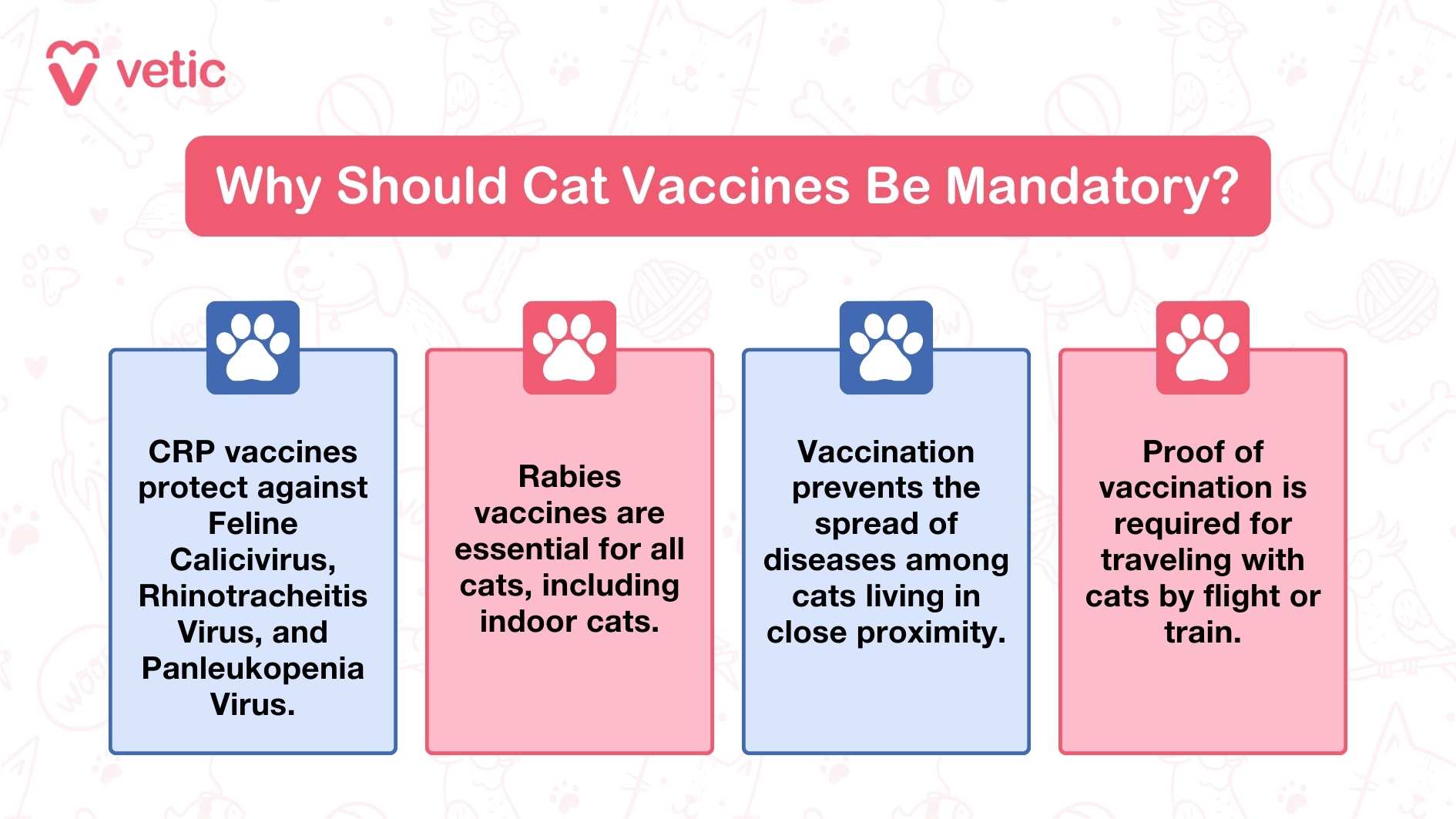
We don’t yet get the vaccines necessary for Feline Leukaemia Virus (FeLV). FeLV is quite common and remains latent in outdoor cats. It depletes their immunity and makes them highly susceptible to the other feline infectious diseases including the 3 mentioned above.
Feline Calicivirus, Feline Rhinotracheitis Virus (Herpesvirus type-1) and Feline Panleukopenia Virus are highly contagious and can spread like an epidemic among cats that live close by. Vaccination is the only way to keep your cat safe and healthy!
If you want to take your cat with you on flight or via train, you will need to provide proof of vaccination before boarding. Hence, choosing a veterinary clinic that provides digital vaccination records, can keep your cat’s vaccination documents in one place!
What infectious diseases can be averted through cat vaccination?
Feline Calicivirus and Rhinotracheitis Virus Infection
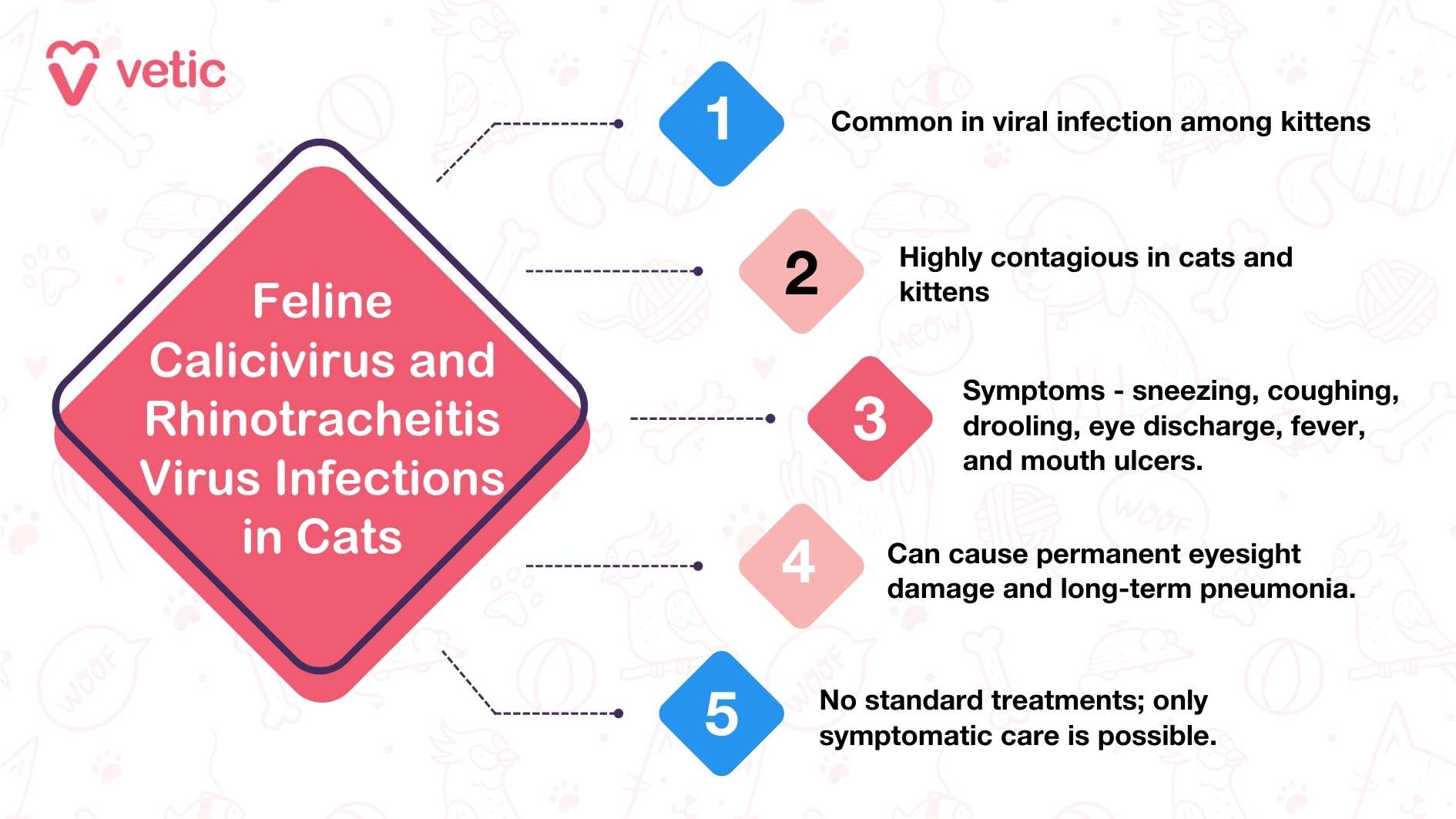
Feline Calicivirus and Feline Rhinotracheitis Virus infections are quite common in India. They are highly contagious. And these viral infections can be lethal for small kittens. Most of the time, kittens catch these viral infections at the breeder’s or catteries. And they begin showing symptoms within the next 14 days, such as:
- Eye Discharge
- Sneezing
- Coughing
- Congestion
- Difficulty In Breathing
- Open-Mouthed Breathing
- Drooling
- High temperature
In many cases, FCV and FRV can cause painful mouth ulcers and inflammation of the gums and teeth.
FRV can lead to permanent eyesight damage and long-term pneumonia in kittens and cats.
There are no standard protocols for the Feline Calicivirus and Feline Rhinotracheitis Virus infections. The veterinarian can only provide symptomatic treatment to the affected cat to keep them stable and ride out the infection cycle of the viruses.
It is often difficult to tell the difference between FCV and FRV infections unless the veterinarian runs proper diagnostic tests. However, most kittens present with an FRV infection as compared to an FCV infection.
Feline Panleukopenia Virus Infection
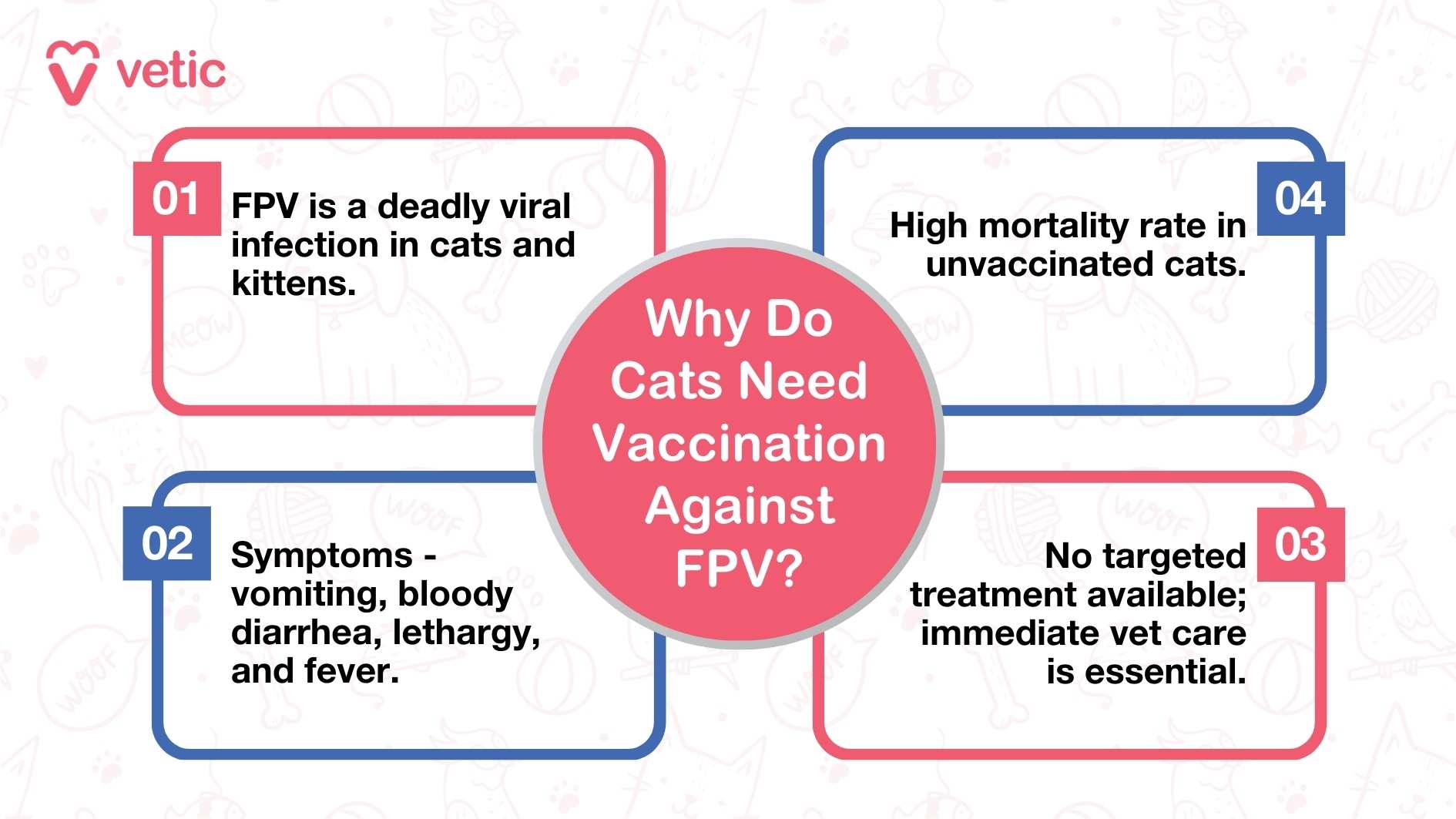
FPV or feline distemper is a deadly infection that can affect both adult cats and kittens. The virus decreases the overall leukocyte or white blood cell (WBC) count, and makes the cat susceptible to secondary viral and bacterial infections.
Most unvaccinated kittens do not get the time to show any signs of an FPV infection.
Adult, unvaccinated cats may show the following signs –
- An upset stomach
- Bloody diarrhoea
- Vomiting
- Painful abdomen
- Lethargy
They may or may not have a high temperature
If your cat is showing any two of the above signs, your first task is to quarantine them from all other cats in and around your home. Contact your vet immediately or take them to the emergency and critical veterinary care centre near you.
Sadly, FPV has a high mortality rate among unvaccinated cats. There is no standardised treatment plan for an FPV infection.
Research shows, the use of Granulocyte Colony Stimulating Factor (G-CSF) in combination with anti-viral therapy provides kittens and cats with a fighting chance. Nonetheless, it is not a cure and no treatment plan exists for combatting FPV or feline parvo.
All three of the above-mentioned viral diseases can be averted with one cat vaccine – CRP or FVRCP
Rabies Vaccine for Cats
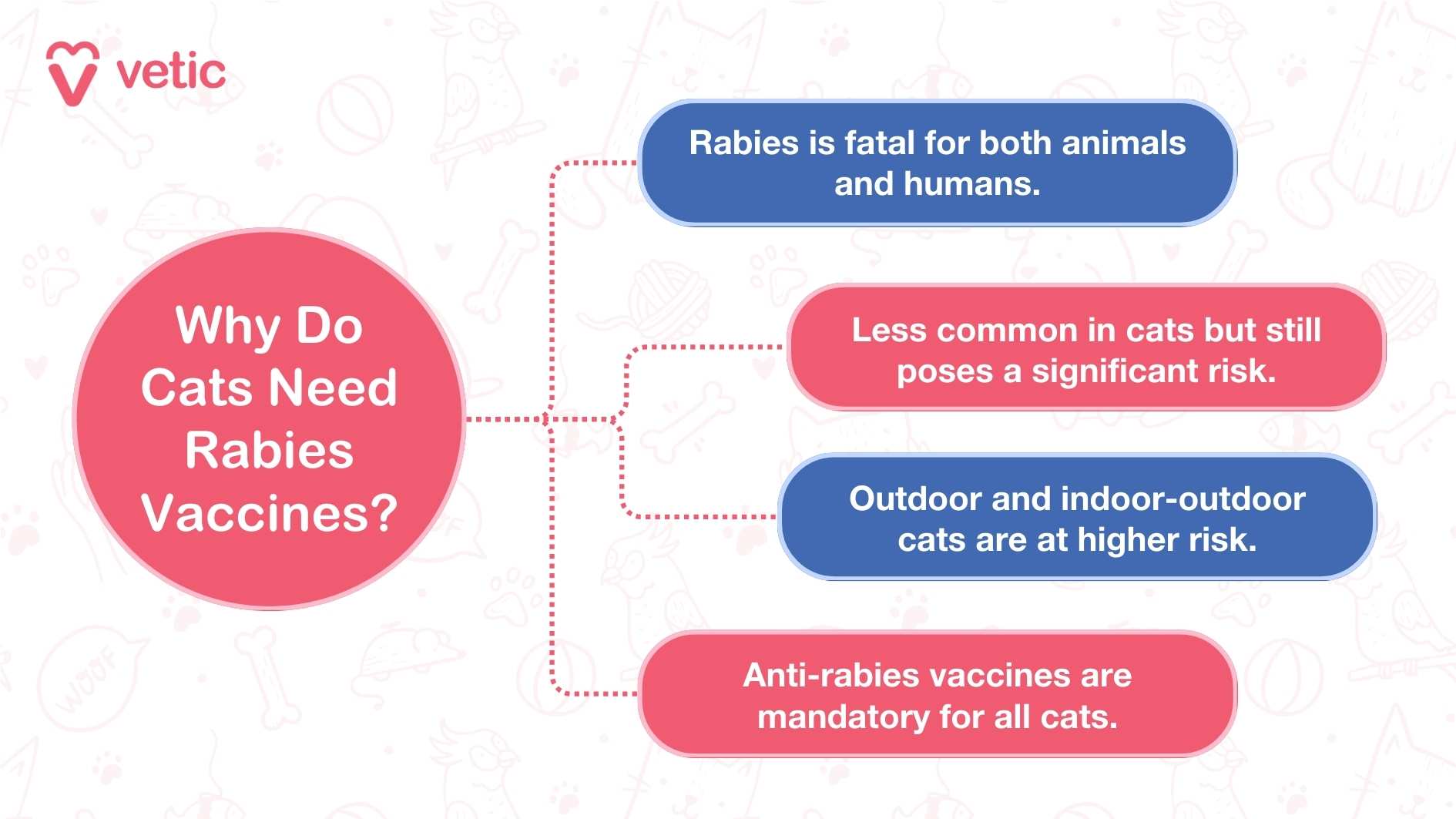
Rabies is a 100% fatal disease that not only affects animals but also humans.
The instances of rabies in cats is fairly less common as compared to dogs. However, a cat can always be exposed to rabies through the bites of an infected dog or cat.
If you have an outdoor cat or indoor-outdoor cat, get them vaccinated against rabies ASAP.
Rabies vaccines are a must for completely indoor cats as well.
Since there is no treatment or cure for rabies once the symptoms begin to show, it’s always better to be safe than sorry. Ask your nearest veterinarian or veterinary clinic about rabies vaccines for kitten or cat. There is no upper age limit for rabies vaccines in kittens or cats. Even senior cats can receive the vaccine with little to no side effects.
When Can You Give the First Cat Vaccine to Your Kitten?
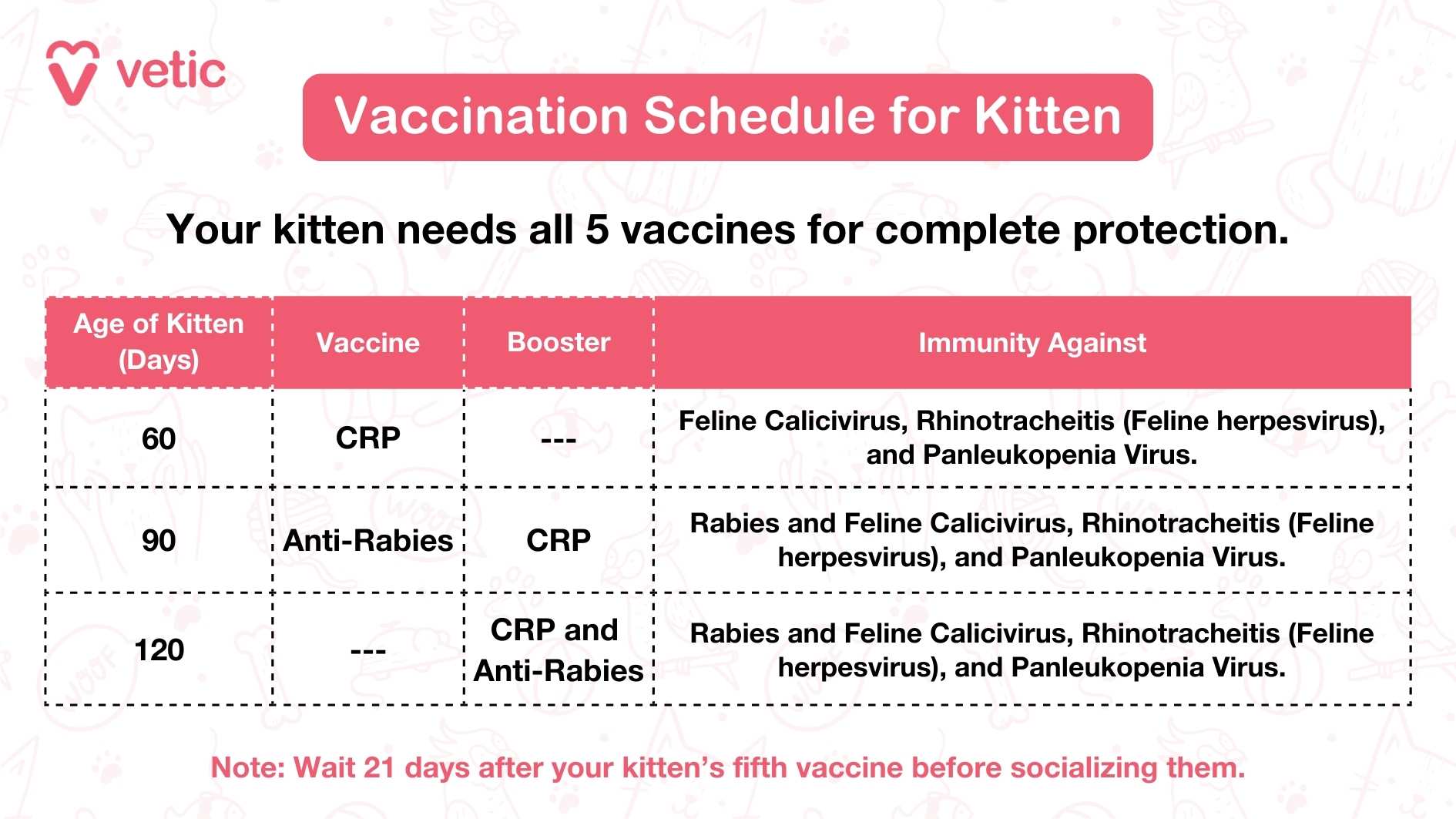
Ideally, your kitten should receive the first dose of CRP vaccine (Feline Calicivirus, Rhinotracheitis Virus and Panleukopenia Virus) at the age of 60 days.
They should receive a second dose of CRP vaccine along with a dose of anti-rabies vaccine (ARV) 30 days after the first dose. That means, they should get the second dose of their CRP vaccine along with the first dose of anti-rabies at the age of 90 days.
After another 30 days, the kitten should receive two more doses of CRP or FVRCP and ARV. Kittens should get their final dose of the annual vaccines (CRP and anti-rabies) at the age of 120 days.
What is the correct age and dose of vaccinating an adult cat?
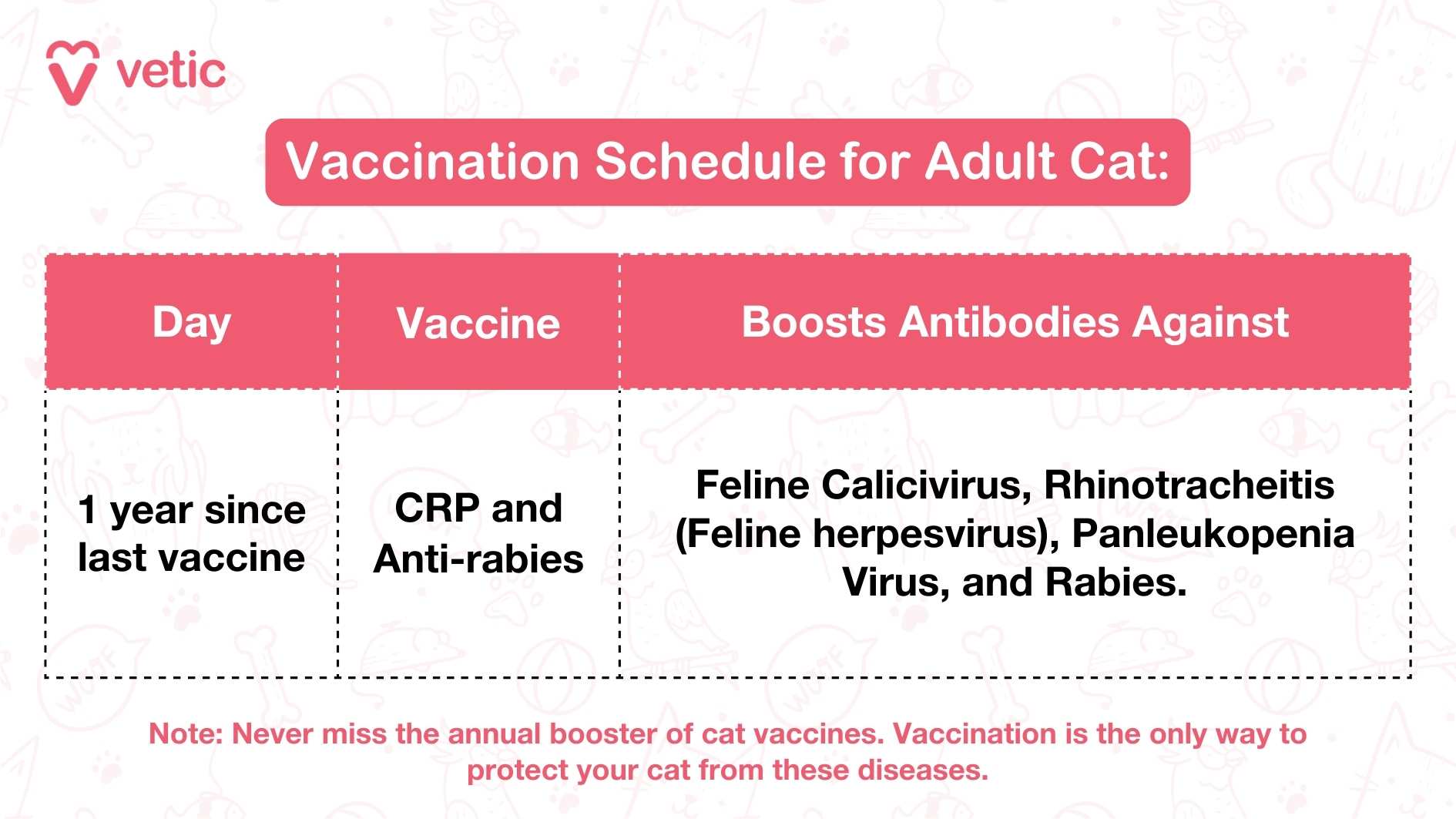
A cat is considered an adult once they are older than 12 months. Any cat who has been vaccinated as a kitten should receive a dose of CRP vaccine or FVRCP and a dose of ARV a year after the last vaccine.
Remember to deworm your cat before the vaccination.
If an adult cat is receiving their first ever CRP vaccine or FVRCP vaccine, the dose should ideally be repeated after 30 days along with a dose of ARV. Few studies have shown that one vaccine is enough. However, for optimal immunity against viral diseases that affect the feline population, a booster of CRP is always recommended by our veterinarians.
Why Do Kittens Require Multiple Doses of the Same Vaccine?
Kittens receive their first dose of vaccine when they are around 60 days old. Since they have just stopped drinking their mother’s milk, their bodies still have the antibodies from the milk which keep destroying the antibodies created after vaccination.
These vaccine-derived antibodies dip between 14 and 21 days, which makes the kitten vulenrable to several common diseases and kittens require another CRP booster to keep the level of their antibodies against feline calicivirus, rhinotrachietis and panleukopenia up.
Similarly, the level of antibodies dip 14 to 21 days after the second dose. And your kitten will require a third dose of CRP along with their rabies. These antibodies will stay in their system for at least a year, before they begin to drop. So, your kitten will receive annual doses of the CRP vaccine and rabies vaccine one year after finishing their kitten vaccination schedule.
Why Does Your Cat Need Vaccines?
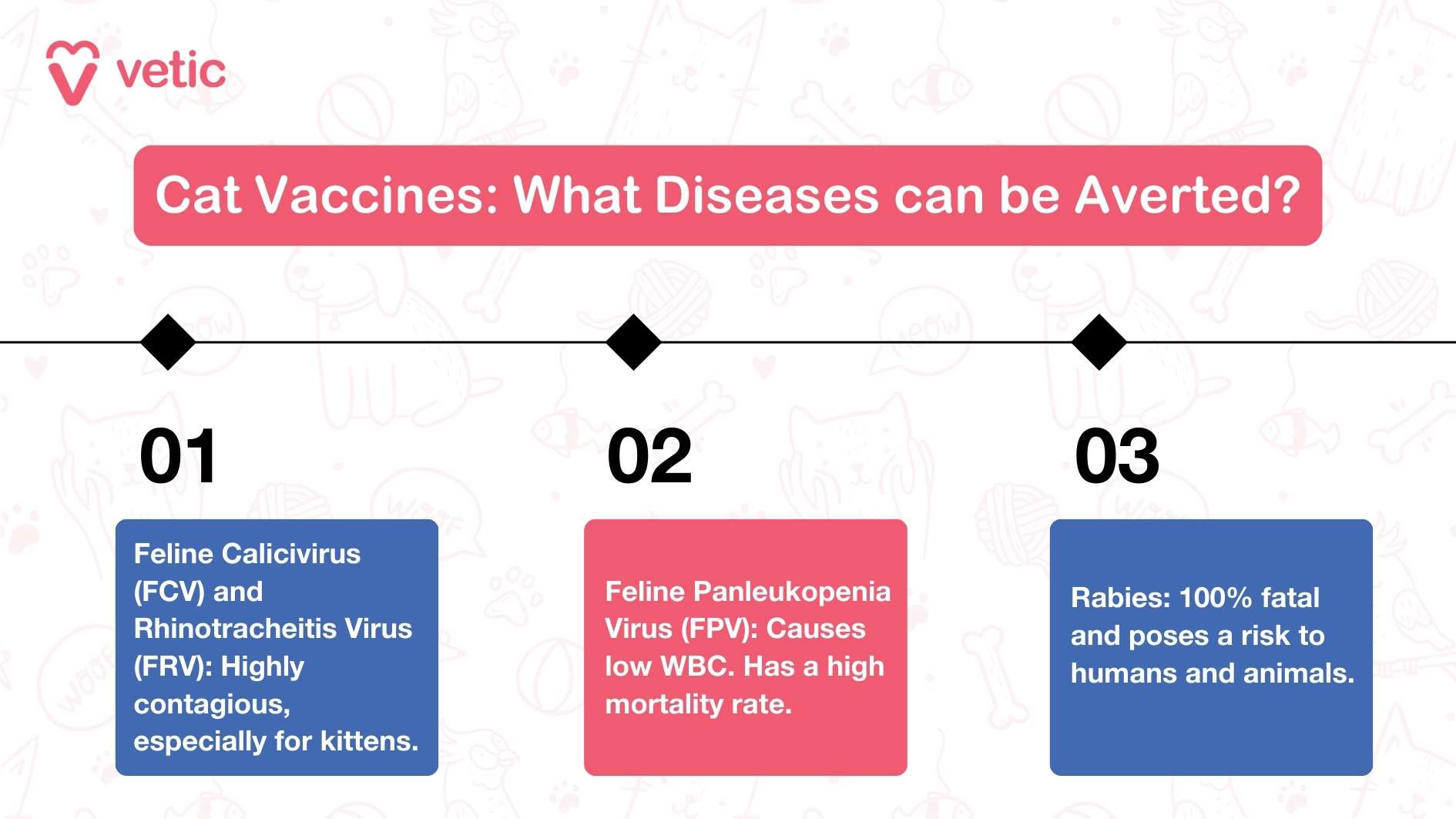
Cat vaccines may seem costly. However, we can assure you that the viral diseases that affect unvaccinated cats cost their parents a lot more financially and emotionally. Never miss a vaccination date!
If you are unsure about your cat’s vaccination dates, download and use the Vetic App. You will get timely reminders for the due vaccinations.
FAQs about Cat Vaccines:
What diseases do CRP vaccines protect against?
CRP vaccines protect against Feline Calicivirus, Feline Rhinotracheitis Virus (Herpesvirus type-1), and Feline Panleukopenia Virus.
Why is rabies vaccination important for cats?
Rabies vaccination is crucial as rabies is 100% fatal and can spread to humans through infected animals’ bites.
When should kittens receive their first vaccine?
Kittens should get their first CRP vaccine at 60 days old, after deworming, with follow-up doses every 30 days.
How often should adult cats be vaccinated?
Adult cats need annual CRP and anti-rabies vaccines, with a booster dose recommended for unvaccinated adults after 30 days.
What is Feline Leukemia Virus (FeLV)?
FeLV is a retrovirus that weakens the immune system, making cats susceptible to other infections and diseases.
Can indoor cats skip vaccinations?
No, indoor cats also need vaccinations to protect against diseases they might encounter if they escape or are exposed.
What is a core vaccine for cats?
Core vaccines protect against common, severe feline diseases: Feline Calicivirus, Feline Rhinotracheitis, Panleukopenia, and Rabies.
Are there vaccines for Feline Immunodeficiency Virus (FIV)?
An Feline Immunodeficiency Virus vaccine exists but is not commonly found in India; consult your vet for specific recommendations for your cat.
Do cat vaccines have side effects?
Some cats might experience mild side effects like lethargy or swelling at the injection site, typically resolving quickly.
What is the difference between modified live and killed vaccines for cats?
Modified live vaccines use weakened virus strains; killed vaccines use inactivated virus particles, both can safely stimulate immunity against the strains used in the vaccines.
Can pregnant cats be vaccinated?
Pregnant cats generally should not receive vaccines; consult your veterinarian for the safest plan for pregnant or nursing cats.

